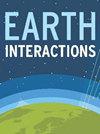The Effect of Surface Oil on Ocean Wind Stress
IF 1.1
4区 地球科学
Q3 GEOSCIENCES, MULTIDISCIPLINARY
引用次数: 1
Abstract
This study provides, to the best of our knowledge, the first detailed analysis of how surface oil modifies air–sea interactions in a two-way coupled model, i.e., the coupled–ocean–atmosphere–wave–sediment–transport (COAWST) model, modified to account for oil-related changes in air–sea fluxes. This study investigates the effects of oil on surface roughness, surface wind, surface and near-surface temperature differences, and boundary-layer stability and how those conditions ultimately affect surface stress. We first conducted twin-coupled modeling simulations with and without the influence of oil over the Deepwater Horizon (DWH) oil spill period (20 April to 5 May 2010) in the Gulf of Mexico. Then, we compared the results by using a modularized flux model with parameterizations selected to match those selected in the coupled model adapted to either ignore or account for different atmospheric/oceanic processes in calculating surface stress. When non-oil inputs to the bulk formula were treated as being unchanged by oil, the surface stress changes were always negative because of oil-related dampening of the surface roughness alone. However, the oil-related changes to 10 m wind speeds and boundary-layer stability were found to play a dominant role in surface stress changes relative to those due to the oil-related surface roughness changes, highlighting that most of the changes in surface stress were due to oil-related changes in wind speed and boundary-layer stability. Finally, the oil-related changes in surface stress due to the combined oil-related changes in surface roughness, surface wind, and boundary-layer stability were not large enough to have a major impact on the surface current and surface oil transport, indicating that the feedback from the surface oil to the surface oil movement itself is insignificant in forecasting surface oil transport unless the fractional oil coverage is much larger than the value found in this study.海面石油对海洋风应力的影响
据我们所知,这项研究首次详细分析了海面石油如何在一个双向耦合模型中改变海气相互作用,即海洋-大气-波浪-沉积物-输运(COAWST)耦合模型,该模型经过修改以解释海气通量中与石油相关的变化。本研究探讨了油对表面粗糙度、表面风、表面和近表面温差以及边界层稳定性的影响,以及这些条件最终如何影响表面应力。我们首先在墨西哥湾深水地平线(DWH)漏油期间(2010年4月20日至5月5日)进行了有和没有石油影响的双耦合建模模拟。然后,我们将采用模块化通量模型的结果与选择的参数化进行比较,这些参数化与耦合模型中选择的参数化相匹配,以适应在计算表面应力时忽略或考虑不同的大气/海洋过程。当体积公式的非油输入被视为油不变时,由于油对表面粗糙度的相关阻尼,表面应力变化始终为负。然而,与油相关的10 m风速和边界层稳定性变化相比,油相关的10 m风速和边界层稳定性变化在表面应力变化中起主导作用,突出地表应力的大部分变化是由于油相关的风速和边界层稳定性变化。最后,由于表面粗糙度、表面风和边界层稳定性等与油有关的综合变化,导致的与油有关的表面应力变化不足以对表面电流和表面油运移产生重大影响,这表明除非油的分数覆盖比本研究发现的值大得多,否则表面油对表面油运动本身的反馈在预测表面油运移方面是微不足道的。
本文章由计算机程序翻译,如有差异,请以英文原文为准。
求助全文
约1分钟内获得全文
求助全文
来源期刊

Earth Interactions
地学-地球科学综合
CiteScore
2.70
自引率
5.00%
发文量
16
审稿时长
>12 weeks
期刊介绍:
Publishes research on the interactions among the atmosphere, hydrosphere, biosphere, cryosphere, and lithosphere, including, but not limited to, research on human impacts, such as land cover change, irrigation, dams/reservoirs, urbanization, pollution, and landslides. Earth Interactions is a joint publication of the American Meteorological Society, American Geophysical Union, and American Association of Geographers.
 求助内容:
求助内容: 应助结果提醒方式:
应助结果提醒方式:


